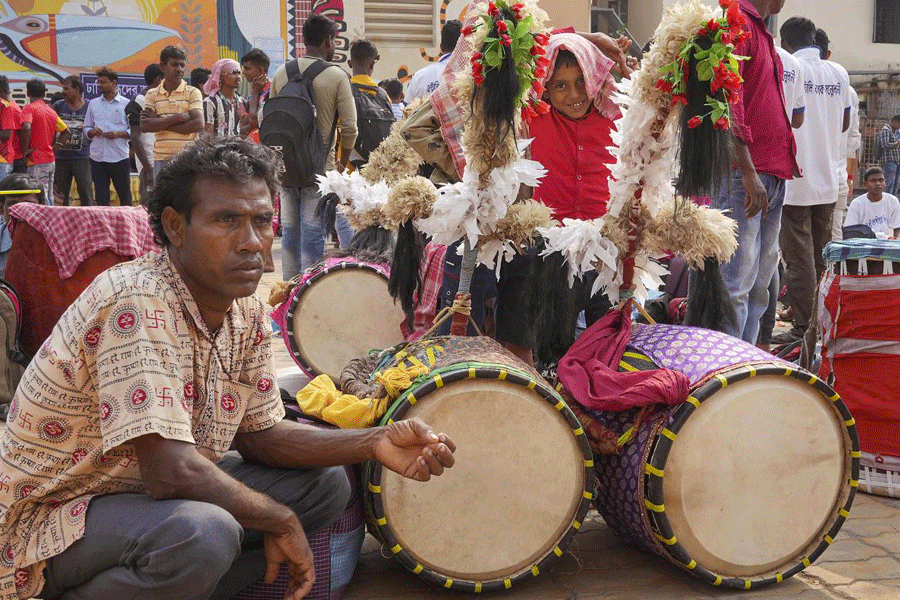The festive season that once promised mobility, joy, and cultural exchange for Bengal's dhakis and purohits is now tinged with dread.
As the sound of the dhak (drum) reverberates through villages ahead of Durga Puja, the very custodians of Bengal's traditions — priests and drummers — say their journeys to other states are being overshadowed by fear of identity-based harassment, linguistic prejudice, and alleged administrative scrutiny in several BJP-ruled regions.
Reports of Bengali-speaking migrants being allegedly harassed in Maharashtra, Gujarat, Delhi, and Rajasthan have cast a long shadow over the season of celebration.
For hundreds of dhakis (traditional drummers) and purohits (priests), the choice is stark: risk humiliation for a livelihood or stay back in economic uncertainty.
In rural Bengal, where the rhythmic beats of dhakis usually signal festive anticipation, the mood this year is clouded with anxiety.
"When we hear about atrocities against Bengali migrant labourers in other states, it frightens us and our families. We have received several invitations from various Puja committees in other states, and since we have already received advance money, we will travel despite being apprehensive. However, some of my teammates are in two minds, whether to go or stay back," says Bapi Das, director of a dhaki troupe.
Das' troupe of nearly 100 skilled drummers has received invitations from organisers in Delhi, Mumbai, Hyderabad, Chennai and Guwahati.
The assignments, stretching for nearly a week of Durga Puja, promise earnings of Rs 20,000-Rs 25,000 per person, which is crucial for families dependent on seasonal incomes.
"Performing outside the state helps us buy clothes, books for our children, even pay off loans," says a seasoned female dhaki of another Dhaki troupe in North 24 Paragana' Ashoknagar, who supplements her income by rolling bidis during the off-season.
"But now, I wonder if I will be stopped or harassed for speaking Bengali?" Her colleague Mitali Barui echoed the same concern. "We used to prepare with joy. Now, even rehearsals feel tense. We have been instructed that whoever travels to other states from our troupe, should keep all their IDs, including copies of their parents' IDs, and if needed, property papers and local panchayat certificates, too," she added.
Many dhakis recount their friends being harassed in the last few months, accused of being "illegal" or "outsiders", simply for speaking their mother tongue.
A similar unease grips Ghatal in West Midnapore, a historic town known for its Brahmin households that send priests across the country for Durga Puja.
"Earlier, we carried only our sacred texts and lists of rituals. This year, we have advised all priests travelling outside Bengal to carry Aadhaar cards, voter IDs, and even property papers," says Ashok Mishra, a priest who has performed Durga Pujas in various parts of the country for the last 12 years.
"We are religious professionals. It is deeply humiliating to be treated like suspects when all we carry are our scriptures and devotion," says Arun Bhattacharya of North 24 Parganas, who has officiated Durga Puja rituals in Mumbai for over 15 years. "Still, I can't afford to lose this year's income. My family depends on it." The growing sense of alienation among Bengali cultural emissaries has sparked political outrage in Bengal.
Leaders of the ruling Trinamool Congress accuse the BJP of fostering an atmosphere hostile to linguistic and regional minorities.
"It is unacceptable that people providing cultural and religious services are made to feel unsafe and unwelcome. Such developments are deeply disturbing and unconstitutional," a senior TMC leader said.
Opposition parties allege that the harassment is part of a broader push to impose a homogenised cultural narrative, sidelining regional identities in favour of a singular, majoritarian ethos.
BJP leaders, however, insist that increased ID checks are routine law-and-order measures, not targeted harassment.
"Security checks are a routine part of managing large gatherings. There is no instruction to target Bengalis or any linguistic group," a state BJP leader said.
Despite such reassurances, ground reports suggest otherwise.
Cultural workers, who often double up as migrants working in various states, recount stories of being taunted, detained, or profiled for speaking Bengali.
And so, as conch shells blow and the sound of drums reverberate in Bengal's villages, their echo carries not just the rhythm of festivity but also an unspoken plea for dignity, security, and the right to keep traditions alive without fear.
Except for the headline, this story has not been edited by The Telegraph Online staff and has been published from a syndicated feed.










